

Qlikview. SAP Crystal Reports. McKesson. Analytics: Moving health care forward. Hospital administrators are leading the use of health care analytics for a range of functions in provider settings.
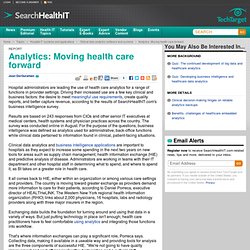
Driving their increased use are a few key clinical and business factors: the desire to meet meaningful use requirements, create quality reports, and better capture revenue, according to the results of SearchHealthIT.com's business intelligence survey. Results are based on 243 responses from CIOs and other senior IT executives at medical centers, health systems and physician practices across the country. The survey was conducted online in August. For the purpose of the questions, business intelligence was defined as analytics used for administrative, back-office functions while clinical data pertained to information found in clinical, patient-facing situations. It all comes back to HIE, either within an organization or among various care settings and providers. Exchanging data builds the foundation for turning around and using that data in a variety of ways.
In-Stat - Press Releases. Healthcare IT Spending on Cloud to Surpass $1 Billion. The healthcare and social services vertical marketplace is extensive.
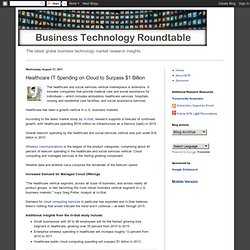
It includes companies that provide medical care and social assistance for individuals -- which includes ambulatory healthcare services, hospitals, nursing and residential care facilities, and social assistance services. Healthcare has been a growth vertical in U.S. business markets. According to the latest market study by In-Stat, research supports a forecast of continued growth, with healthcare spending $518 million on Infrastructure as a Service (IaaS) in 2015. Pdf/Frost & Sullivan_Q4 2010 US Healthcare CIO Survey_Selected Excerpts.pdf. Making analytics a strategic resource for health care quality improvement - Community Blog. Oct 26 2011 7:00AM GMT Posted by: Jenny Laurello BI, business intelligence, Data analytics, Health care analytics, Health care quality, QI, Quality improvement, Quality measures Guest post by: Trevor Strome MSc, PMP, Informatics Lead, Winnipeg Regional Health Authority; Assistant Professor, Department of Emergency Medicine, Faculty of Medicine, University of Manitoba The use of healthcare analytics is rapidly transforming how health care organizations (HCOs) improve clinical quality, operational efficiency and patient safety.
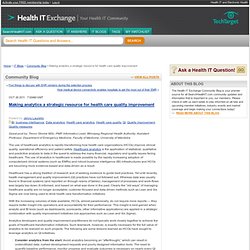
Healthcare analytics is the application of statistical, qualitative and predictive analysis to data in the quest to address the many financial, regulatory and quality issues facing healthcare. Healthcare has a strong tradition of research and of seeking evidence to guide best practices. Analytics developers and quality improvement practitioners do not typically work closely together to achieve the goals of healthcare transformation initiatives.
Healthcare Analytics – A Strategic Resource for Healthcare Quality Improvement. Analytics is changing how health care organizations (HCOs) improve clinical quality, operational efficiency and patient safety.
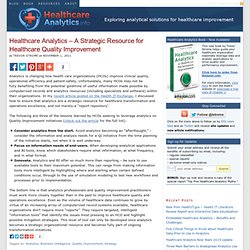
Unfortunately, many HCOs may not be fully benefiting from the potential goldmine of useful information made possible by computerized records and analytics resources (including specialists and software) within their organizations. In my recent article posted on the Health IT Exchange, I discussed how to ensure that analytics are a strategic resource for healthcare transformation and operations excellence, and not merely a “report repository’. The following are three of the lessons learned by HCOs seeking to leverage analytics on Quality Improvement initiatives (check out the article for the full list): Consider analytics from the start.
Avoid analytics becoming an “afterthought,” – consider the information and analysis needs for a QI initiative from the time planning of the initiative starts, not when it is well underway.Focus on information needs of end-users. Global Market For Cloud Computing In Healthcare - Market Research Report MarketsandMarkets. The healthcare cloud computing market is segmented on the basis of component, deployment model, pricing model, application, service model, end user, and region.
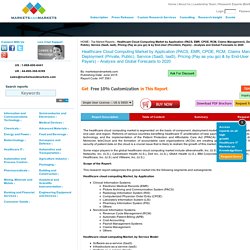
Reforms of various countries benefiting healthcare IT, proliferation of new payment models and the cost-efficiency of cloud technology, and the implementation of the Patient Protection and Affordable Care Act (PPACA) are the major factors driving this market. Moreover, teleCloud and the formation of accountable care organizations (ACOs) are creating growth opportunities for the . However, the security of patient data on the cloud is a crucial issue that is likely to restrain the growth of this market. Some major players in the global healthcare cloud computing market include athenahealth, Inc. (U.S.), CareCloud Corporation (U.S.), ClearData Networks, Inc. Scope of the Report: Healthcare Cloud Computing Lifts Off: Tech Giants Make Moves.
Www.aspenadvisors.net/beta/sites/default/themes/asp/files/Cloud_Computing_is_there_a_Silver_Lining.pdf. Healthcare Information Technology - HLC048C. Www.accenture.com/SiteCollectionDocuments/PDF/Accenture_Innovation_Center_Health_New_View_Whats_Possible_Health_Care_Payers_full.pdf. Www.accenture.com/gb-en/landing-pages/health-public-service/Documents/UK_Paid_Search_LP/Accenture_UK_HealthPS_Healthcare_IT_Leaders_Must_Re-Energize_Push_Toward_Patient-Centered_Healthcare.pdf.
Www.accenture.com/gb-en/landing-pages/health-public-service/Documents/UK_Paid_Search_LP/Accenture_UK_HealthPS_The_Next_Healthcare_IT_Trend_Making_Software_as_a_Service_for_ERP.pdf. Accenture EMR Markets Whitepaper Vfinal. EHR Software Market Share Analysis. Research and Markets: Healthcare IT Market to 2016 - Demand for Integration of Advanced Clinical Applications to Drive the Market.
DUBLIN--(BUSINESS WIRE)--Research and Markets ( has announced the addition of the "Healthcare IT Market to 2016 - Demand for Integration of Advanced Clinical Applications to Drive the Market" report to their offering.
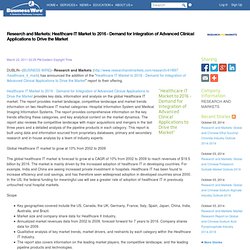
“Healthcare IT Market to 2016 - Demand for Integration of Advanced Clinical Applications to Drive the Market” Healthcare IT Market to 2016 - Demand for Integration of Advanced Clinical Applications to Drive the Market provides key data, information and analysis on the global Healthcare IT market. The report provides market landscape, competitive landscape and market trends information on two Healthcare IT market categories -Hospital Information System and Medical Imaging Information Systems. The report provides comprehensive information on the key trends affecting these categories, and key analytical content on the market dynamics. Global Healthcare IT market to grow at 10% from 2002 to 2009 Scope Reasons to buy Key Topics Covered: Companies Mentioned:
Viewics - Healthcare Analytics. Healthcare IT Spending To Reach $40 Billion - Healthcare - Electronic Medical Records. The U.S market for healthcare IT hardware, software, and services is expected to grow 24% annually for several years, driven in part by mandatory use of EHRs.
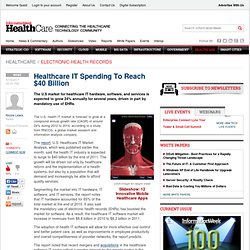
(click image for larger view) Slideshow: 12 Innovative Mobile Healthcare Apps The U.S. health IT market is forecast to grow at a compound annual growth rate (CAGR) of around 24% during 2012 to 2014, according to a study from RNCOS, a global market research and information analysis company. The report, U.S. Healthcare IT Market Analysis, which was published earlier this month, said the health IT industry is expected to surge to $40 billion by the end of 2011. Segmenting the market into IT hardware, IT software, and IT services, the report notes that IT hardware accounted for 65% of the total market at the end of 2010. The mobile health market has a year-over-year growth rate of around 17% since 2010 and is estimated to be worth $2.1 billion at the end of 2011. Another trend of note is the adoption of Apple's iPad tablets.